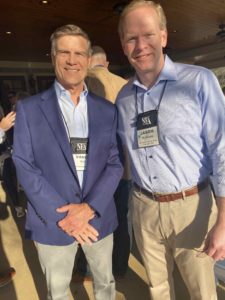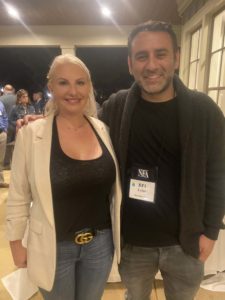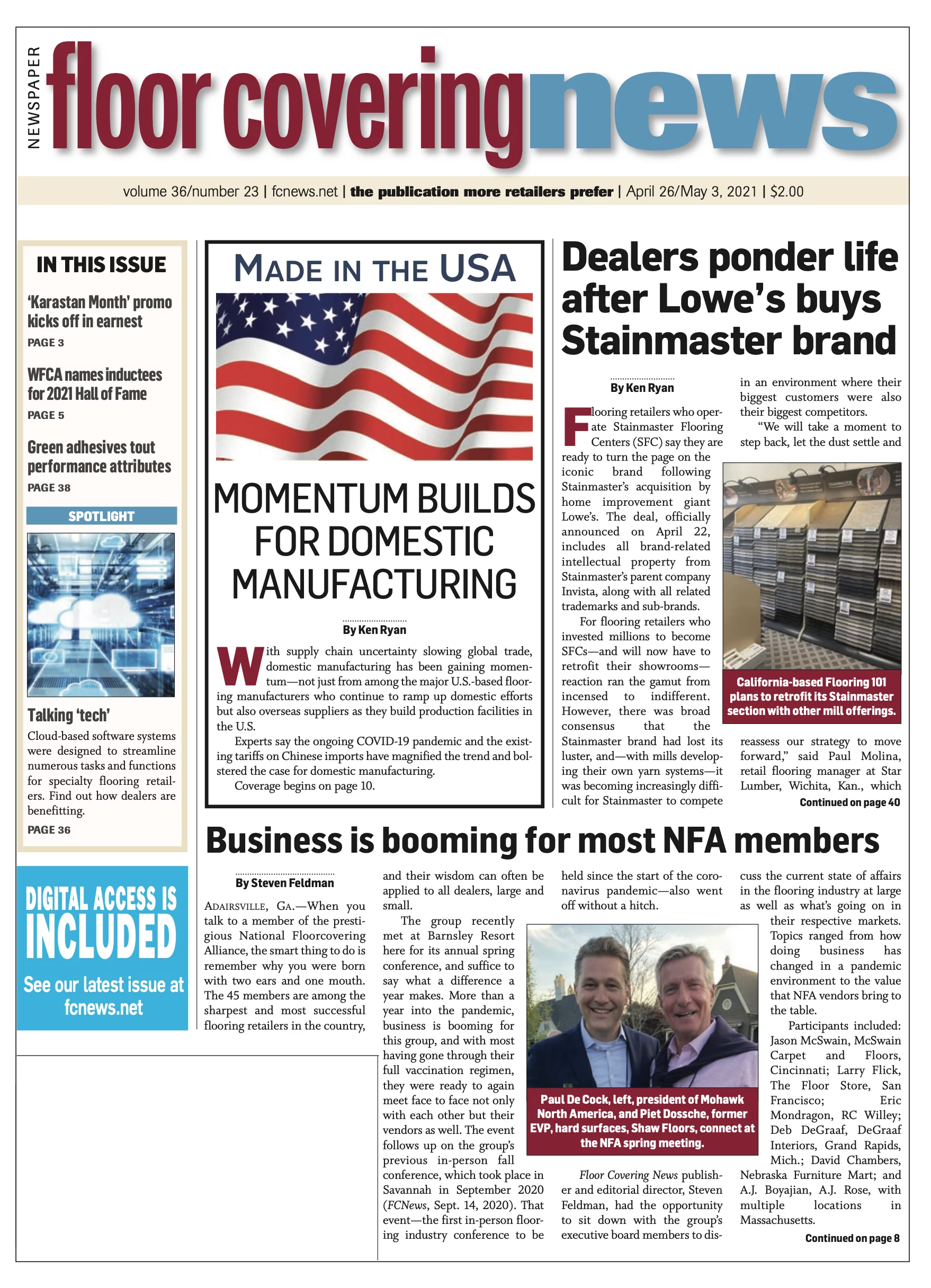By Steven Feldman Adairsville, Ga.—When you talk to a member of the prestigious National Floorcovering Alliance (NFA), the smart thing to do is remember why you were born with two ears and one mouth. The 45 members are among the sharpest and most successful flooring retailers in the country and their wisdom can often be applied to all dealers, large and small.

The group recently met at Barnsley Resort here for its annual NFA spring conference, and suffice to say what a difference a year makes. More than a year into the pandemic, business is booming for this group, and with most having gone through their full vaccination regimen, they were ready to again meet face to face not only with each other but their vendors as well.
The event follows up on the group’s previous in-person fall conference, which took place in Savannah in September 2020. That event—the first in-person flooring industry conference to be held since the start of the coronavirus pandemic—also went off without a hitch.
Floor Covering News publisher and editorial director, Steven Feldman, had the opportunity to sit down with the group’s executive board members to discuss the current state of affairs in the flooring industry at large as well as what’s going on in their respective markets. Topics ranged from how doing business has changed in a pandemic environment to the value that NFA vendors bring to the table.
Participants included: Jason McSwain, McSwain Carpet and Floors, Cincinnati; Larry Flick, The Floor Store, San Francisco; Eric Mondragon, RC Willey; Deb DeGraaf, DeGraaf Interiors, Grand Rapids, Mich.; David Chambers, Nebraska Furniture Mart; and A.J. Boyajian, A.J. Rose, with multiple locations in Massachusetts.
Anything noteworthy happen at the members-only meeting?
Jason McSwain: We brought in a couple speakers who talked about preparing for the future—the value of looking at the threats that are out there and what we can be doing today. You can ignore them or you can be proactive and say, “Hey, we need to learn more about that.”
What do you see as threats down the road?

McSwain: They are global as well as domestic. From a domestic standpoint, competition not only from what we know today, but are there [companies] that change on that list? Is there another Floor & Decor out there that is growing or taking advantage of a market opportunity that materialized because of COVID- 19? In many cases, we have members that are totally dialed in and on top of it. We can bring value to the other members by putting that on their radar.
Larry Flick: And are we losing market share to them? And if so, or if not, what can we do to make sure we don’t lose market share but actually gain market share.
David Chambers: Just any domestic threat—if it’s competition, what is it? We’re just trying to prep the group and make sure they’re looking two years into the future and trying to understand what’s really going on in the industry.
Being among the top retailers in the country, how do you compete against a Floor & Decor?
A.J. Boyajian: I think it’s service. Because it’s not price. For us, it’s all about service and online reputation, all those things that will drive people in.
Deb DeGraaf: And isn’t it about us creating an experience, too? Experience followed by service. That’s our biggest thing—how can we differentiate? We offer people something to drink when they come into the showroom. We offer them an area for the kids to play. We give them a gift when we go and measure, something to leave behind.
Flick: We try to be the Nordstrom of the flooring business, and the customer is always right regardless of if she’s right or wrong. We’re not going to win, pricewise. We don’t even want to win, pricewise. We may be the cheapest, we may not be, but our service is going to overcome any of those questions.
Eric Mondragon: I never apologize for being higher priced. I explain to customers the value what they’re getting, what they’re paying for, the whole service that comes along with it. I always use the analogy of going to a restaurant. You have a choice. You can go to the drive-up window at McDonald’s and get a greasy burger and fries in a bag. And if it’s wrong, that was your expectation. You only paid five bucks for it. Or you go to a nice, sit-down restaurant and your expectation is higher. You’re willing to pay for it if you have the experience. And we try to provide that shopping experience so they don’t squawk at the price.
McSwain: Yesterday, as we went around that room, you need to be a dynamic retailer or a dynamic business. If we’re leaders in retail, leadership isn’t looking how to get our business back to the way it was before COVID-19, it’s where you want to be: being dynamic and changing your business fast enough for those changes that are out there.
The average NFA member is up what percent for the first quarter this year over Q1 2019?
McSwain: 20%.
Mondragon: Maybe even toward 25%. Everybody I talk to right now is saying anything from 25% to over 30%.
How did your state’s policies affect your business last year?

DeGraaf: One day we were open and the next day we were closed. And if you were open, you had police in your showroom. I’m Zooming with my staff every single day. I’m trying to update them on what we can and can’t do, because I had staff that would say, “Hey, this customer wants to meet me.”
“Well, you can leave samples outside and the customer can come pick them up.” We were forced to close for 10 weeks.
What happened once you reopened?
DeGraaf: The floodgates were wide open. Like drinking through a fire hose. We wound up having our best year ever because when the gates opened, we not only had to finish what we started, but we had to finish what we would have started.
Flick: We stayed open the entire time, so I’m a contrarian. We did by appointment only. I laid off 7% of our salespeople, but our managers stayed. We had one or two salespeople in every store. I advertised like crazy. I reduced my advertising budget 15%, but because advertising was so inexpensive, I literally doubled the number of ads that we were running on TV. We were on TV every six seconds. People were calling me saying, “God, get off the TV.” But while business was off 40% for the two months we were “closed,” because my overhead was cut so dramatically, we were actually profitable. And almost within a month of being reopened, we were right back to where we were prior to or ahead. So, we had a record year.
Boyajian: We were down 50% for a quarter. It was devastating. And when it turned back on, our customers were still hesitant to come. They didn’t want people around them. It did not turn on until the middle of September, but we had our busiest fourth quarter in the history of mankind.
With business coming back, are you finding it hard these days with the federal government incentivizing people to not work to hire people? Installers, salespeople, warehouse, etc.?
DeGraaf: We never let go of a single person during COVID-19. We just kept them on staff and gave them full wages. When we reopened, we were so busy, but I think one nice thing is we’ve picked up some people that got let go from competitors. So, we ended up getting some great people. While we never had any of our people not come back because they were getting their stimulus money, I can’t speak for our installers and their helpers that went to the well and are having a hard time getting them back from the well.
Flick: We rehired everybody, as I said, and we did it relatively quickly. And, in the last six months, we’ve hired 21 new salespeople and we’re still short. So, one of our biggest challenges right now is recruiting.
Mondragon: We’re down about 20 salespeople, and I’m also having a hard time finding operational staff for the office.
Are you finding these people are not wanting to go back to work because of the extra unemployment?

Mondragon: Absolutely. I think some, because of the unemployment, can actually make more. They can be more selective on where they want to work, and we’re not the highest paying employer out there. So, we’re competing even with fast food.
It’s physical work. And these younger guys, most of them are living at home with mom and dad, so they don’t necessarily need to work.
Today, how long, on average, does it take for a consumer to have their flooring installed from time of purchase?
DeGraaf: Depends on the product. For carpet, four weeks; for SPC you’re at eight. Mondragon: For me, it’s three to eight weeks.
Boyajian: Our issue is salespeople, not labor.
DeGraaf: We’re scheduling end of June and July for tile.
Flick: Any place that has a large Latino population is certainly ahead of the curve as far as installers go, and we have a huge Latino population. So, as far as installations go, we’re a couple weeks out.
Boyajian: I think that’s exactly right. We have a huge Brazilian population, and they’re 85% of our installers.
McSwain: We heard from the membership that we’re comfortable if it’s two weeks or less for retail, but if a consumer has now become accustomed to waiting a number of weeks for a custom sofa or an appliance, where that has been stretched out, she is somewhat expecting [an extended time for installation].
Chambers: If it’s in-stock goods, which we stock a lot, all of our categories are only about a week to two weeks out. Our install capacity is really good right now. Stronger than it’s probably been in the last five years. But if it’s special order, you’re at the will of the supplier.
Flick: We’re a week and a half to two weeks on everything but ceramic. With ceramic, because there’s just not a lot of ceramic installers anywhere, we could be nine weeks out. And there are not many people who are qualified to do that anymore.
How are your suppliers doing as far as inventory levels? Has it gotten any better?
Chambers: Depends on the category. I feel like carpet’s getting better in certain aspects. SPC is getting worse, not necessarily for pandemic reasons.
Flick: Anything that’s imported is a problem. Wood, SPC, tile.
DeGraaf: We will be told, “Yeah, we’ve got that.” And we call to check on it and they’ll say, “Oh yeah, we didn’t have that. It’s ordered and it’s eight weeks.” Now, I’m a week later. Communication on back orders has not been good.
Are you finding that some suppliers are better than others with stock?

Flick: CALI tends to be better than most. COREtec? Luckily, we stock a tremendous amount of inventory, so we’re not in as bad a shape as a lot of people. I think anyone who does nothing but special orders is not very happy right now.
DeGraaf: One thing COREtec does is if you order COREtec online it immediately gives you an alternate, but an alternate they have inventory of, which I thought was proactive.
Give me a few suppliers that are going above and beyond for this group over the last six months.
McSwain: AHF is really trying to understand the needs of each member, which is different cities, different states, different regions. This group got to create the product that is in that Robbins program. They took time to develop it, but they were very much understanding of what individual members were looking for going to market with hardwood.
Chambers: I know they’re dealing with supply chain issues, but Shaw and all their brands is a big supporter and collaborator with us. I still really feel like even though they’re having some inventory issues, they really tried to step up their communication and transparency and really help out as much as they can.
Flick: CALI and Karastan. CALI has made some agreements with a supply chain, and they have their own docks. Now, instead of coming outside of Orange County waiting for four weeks to get a docking space, they literally go from China directly to their own dock and get offloaded. So, they haven’t had the import issues with containers that almost all the other importers have. And as far as Karastan goes, I never really had any issues as far as back orders go with them.
Boyajian: AHF. We still do a lot of hardwood. We don’t stock much, but we do stock a few hardwoods and they put a program together for us that’s absolutely phenomenal.
Mondragon: I think all my core vendors really worked very hard at taking care of us during this time. We’re always one of the larger accounts, so combined Shaw/COREtec still always do a great job for me. Mannington combined with the distributor I buy from. They’re always in my stores. And CALI as well.
Flick: COREtec has been unbelievably great to us as far as inventory goes. If we order X amount of pallets, they get them to us, come hell or high water.
How have your businesses permanently changed because of COVID-19?

DeGraaf: Realizing that working from home can be an option. I’m working more remotely. I learned to just depend on the key personnel on our team and their judgment in growing them to own a decision and own their job. Flick: We started shop at home. It’s too early to know how we’re going to do with it, but I’m pleased with the initial results.
Chambers: We’ve seen the customers’ expectations about how they want to shop has changed forever. Meaning, if you’re not offering every option, be it brick and mortar, online, shop at home, virtual, they want to shop how they want to shop and they’re going to find the outlets to do so. So, it has really forced us to take a hard look at our online experience and make adjustments necessary to improve that experience. We’re launching shop at home as a part of our customized shopping experience. We do virtual appointments where a customer can shop via virtual and have samples sent.
Mondragon: What’s funny is we’re up 30%, yet we’re off 20% in personnel. Our hours have shortened three hours a day. We’ve streamlined so much and trimmed all the fat that I don’t know if we’ll ever go back to those extended hours and having those one-function jobs that we had in the past. Like Dave said, customers want to shop [their way], and because of that, we don’t need to be open from dusk to dawn. It’s been proven that we can do it in shorter hours with less people and remotely and still be up 30%.
Some dealers told me they shut their doors on Sundays during COVID-19 and realized that people will simply come in on a Saturday or Monday. Have any of you shut on Sundays?
Mondragon: We’ve always been closed Sundays.
Flick: We closed for two Sundays when it first came down, and I couldn’t handle it. I had to reopen on Sundays. We close two days a year and I’m not happy those two days.
DeGraaf: We’re in Western Michigan, so we would never be open on a Sunday. And after the holidays this past season, we were closed on Saturdays because it was Christmas and New Year’s. We still are closed on Saturdays. I think we’ll keep it like that through the summer and then we’ll see where it goes from there.
Flick: The one thing you don’t want to do is mess up the white glove service. We all talked about how important that is, so do you raise your margins? Do you stop advertising during sales? Do you close on a Saturday? You need to do something to make sure your quality doesn’t start to slip. Because we’re booked, we’re maxed out. And I’m not sure if that’s the way to handle that.
You once told me you have to sell two SPC jobs to make the same money that you used to make on one hardwood job. Are you ever successful at trading them off waterproof into hardwood?

DeGraaf: We’re trying to put them into a higher-end LVP vs. the $1.99. We want them in the $3.99 range, so we’re stocking more higher-end LVPs than we had before and selling more of that because we have them.
Chambers: I think we’re going to see an interesting experiment play out with this last round of price increases that just came through. Some of these LVPs are just as expensive as wood, if not more expensive at this point. And it wouldn’t surprise me at all if we see a resurgence of the wood category in some fashion.
Laminate as well.
Flick: Laminate is a great little business.
Chambers: We’re doing exceptionally well with laminate right now. For those retailers that gave up on that when the big box stores wanted to take it over, shame on them. That’s a great little business.
Mondragon: Laminate has resurged.
DeGraaf: We’re actually doing very well with laminates right now. It’s more durable for scratching than LVP every day of the week. You tell it to somebody who has a dog running around and she says, “Oh, you better show me laminate then.”
Flick: There’s nothing that upsets me more than when a client walks in the store and our sales- people take her directly to LVP. They’re trained to start at hardwood—30% of our sales are hardwood—and then work down. If they don’t do that and try to go the easiest route, which is LVP, then your best seller is LVP. So, to me, it’s a training issue.

